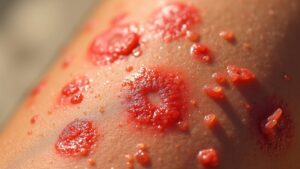You’ve probably felt the sting of a sunburn before, but sun poisoning takes it to another level—and understanding the signs could save you from serious trouble. Your skin could turn fiery red, swell painfully, or even blister, but that’s just the start. Fever, chills, and dizziness can hit hard, making you feel like you’ve got the flu. Add nausea, a racing heart, or confusion, and it’s clear your body’s sounding the alarm. Don’t brush it off; these symptoms mean you need help fast.
Severe Redness and Swelling of the Skin
Severe redness and swelling of the skin are hard to miss—and a sure sign of sun poisoning.
Whenever UV rays damage your skin, your body triggers an inflammatory response, causing that bright red, painful flush. The swelling makes your skin feel tight and warm, almost like a bad sunburn turned up a notch. Should it worsen, blistering can follow, signaling deeper sun damage.
Sometimes, the reaction peaks a day or two later, so don’t assume it’s over just because the initial sting fades. Watch for systemic symptoms like fever or chills—they mean your body’s struggling, and you could need medical attention.
To ease discomfort, cool compresses and hydration help, but prevention (like sunscreen and shade) is your best defense.
Listen to your skin—it’s telling you it’s had too much sun.
Blister Formation on Sun-Exposed Areas
Blistering from sun poisoning isn’t just uncomfortable—it’s your skin’s way of sounding the alarm. Whenever you’ve had prolonged UV exposure, your skin can develop second-degree burns, leading to painful, fluid-filled blisters.
These blisters are your body’s inflammatory response, trying to protect deeper layers of skin while healing begins. They’ll likely feel tender and could appear within hours or a day after sun damage.
Resist the urge to pop them—breaking them raises infection risks and slows skin healing. Instead, keep the area clean and covered.
Over time, the blisters will dry out, and peeling skin signals progress toward complete recovery. Stay patient; severe cases can take weeks to heal. Protect your skin to prevent infection and support faster healing.
Intense Pain or Tenderness in Affected Areas
At the moment your skin feels like it’s on fire after too much sun, that’s more than just a bad sunburn—it’s a sign of sun poisoning.
The intense pain or tenderness in affected areas isn’t just discomfort; it’s your body screaming about serious skin damage. This pain often peaks a day or two after sun exposure, leaving even light touches feeling unbearable.
Should your skin sting with movement or pressure, it’s a red flag. Severe sunburn can trigger systemic symptoms like fever or chills, but the pain alone could be enough to send you scrambling for relief.
Whenever the tenderness limits your daily life, don’t tough it out—seek medical attention. Ignoring it risks worsening damage or infection, so listen to your body.
Fever and Chills
Whenever your body reacts to severe sunburn with fever and chills, it’s not just feeling overheated—it’s a warning that the damage goes deeper than your skin. These systemic symptoms mean your body is fighting the inflammation caused by excessive sun exposure. Here’s what you need to know:
- Fever over 101°F (38.3°C): A high temperature signals your body’s inflammatory response to skin damage, often peaking a day after sunburn.
- Chills as a counter-reaction: Your body shivers to regulate its temperature, even though you feel hot.
- Dehydration risk: Fever and chills can worsen fluid loss, so drink plenty of water.
- At what point to seek help: A persistent high fever or severe chills means it’s time for medical evaluation—don’t ignore it.
Stay alert; these signs mean your sunburn needs more than aloe vera.
Headache and Dizziness
Headaches and dizziness can hit hard as sun poisoning kicks in, and they’re more than just a nuisance—they’re your body’s way of sounding the alarm. Whenever dehydration sets in from severe sunburn or prolonged exposure, your brain screams for hydration, leaving you with a pounding headache. Dizziness often follows, especially as heat exhaustion creeps in, making you feel lightheaded or unsteady. These symptoms shouldn’t be ignored; they’re red flags that you need shade, water, and rest. In case they worsen or come with confusion, seek medical attention—it could mean your body’s struggling more than you realize.
| Symptom | Likely Cause | Action Needed |
|---|---|---|
| Headache | Dehydration | Drink water, rest |
| Dizziness | Heat exhaustion | Move to shade, cool down |
| Both severe | Sun poisoning | Call a doctor |
Stay alert—your body’s telling you something.
Nausea or Vomiting
Sun poisoning doesn’t stop at headaches or dizziness—it can twist your stomach, too. Nausea and vomiting are common symptoms of severe UV exposure, signaling your body’s distress. These reactions often pair with fever or headache, making you feel flu-like. Here’s what you should know:
- Timing matters: Nausea could hit 24-36 hours after sun exposure, worsening as sun poisoning progresses.
- Hydration is key: Vomiting can lead to dehydration, so sip fluids slowly to stay balanced.
- Watch for severity: Should nausea persist or you vomit repeatedly, seek medical attention—it could mean deeper damage.
- Other red flags: Blistering with vomiting? That’s your cue for urgent care.
Your body’s shouting for help—listen to it. Rest, hydrate, and don’t tough it out should symptoms escalate.
Dehydration and Fatigue
Even in the case that you’ve dodged nausea, dehydration and fatigue can sneak up on you after too much sun.
Whenever your body loses fluids faster than you replace them, dehydration sets in, leaving you with symptoms like intense thirst, dark-colored urine, and a dry mouth. Your energy tanks because your body’s struggling without enough water, making fatigue hit hard.
Sun poisoning worsens this—your skin’s damage cranks up fluid loss, so even though you don’t feel thirsty right away, your body’s begging for help.
Sip water steadily, and in the event that you’re peeing less or feeling dizzy, get medical attention. Recovery starts with rehydrating, but don’t wait until you’re parched—prevent it by drinking before, during, and after sun exposure.
Listen to your body; it’s smarter than you realize.
Rapid Heartbeat or Breathing
At the time your heart starts racing or your breathing speeds up after too much sun, it can feel scary—but it’s your body’s way of signaling distress.
Sun poisoning triggers physiological stress, often due to dehydration or systemic symptoms, pushing your heart rate and breathing patterns into overdrive. Here’s what’s happening:
- Rapid heartbeat: Your elevated heart rate is a response to dehydration or fever, signaling your body’s under strain.
- Breathing changes: Shallow, fast breaths mean your body’s struggling to compensate for low oxygen levels.
- Dehydration link: Without enough fluids, your heart works harder, worsening the rapid heartbeat.
- When to act: Should symptoms persist or feel severe, seek immediate medical evaluation—don’t wait.
Listen to your body; it’s asking for help.
Confusion or Fainting
Whenever your heart races and breathing speeds up, your body’s already signaling distress—but in the event your thoughts start fogging or you suddenly feel lightheaded, the situation’s escalated.
Confusion or fainting are serious symptoms of sun poisoning, often tied to dehydration and elevated body temperatures. Should you be overheating, your brain struggles to function, leaving you disoriented or even causing a sudden collapse. This isn’t just heat exhaustion; it’s your body screaming for help.
Dehydration lowers blood pressure, making fainting more likely, while confusion signals your system’s stressed.
Don’t brush it off—these signs demand immediate medical intervention. In case you or someone else stumbles over words, can’t focus, or blacks out, get shade, hydrate, and call for help. Ignoring these symptoms risks worse complications, so act fast.
Conclusion
Should you notice these symptoms, don’t brush them off like some medieval plague—sun poisoning is serious. Your skin’s screaming for help, and so is your body. Hydrate, get out of the sun, and call a doctor in case things feel worse. Listen to what your body’s telling you; it’s smarter than you realize. Stay safe, and don’t let a sunny day turn into a nightmare.





